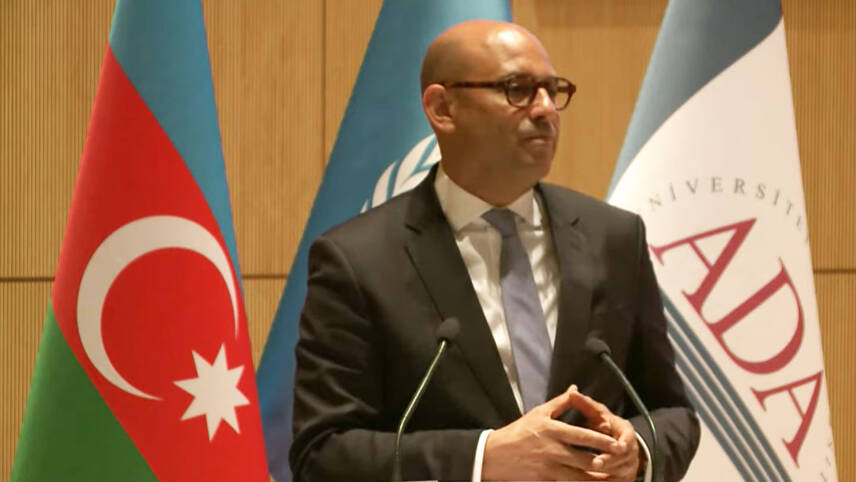Register for free and continue reading
Join our growing army of changemakers and get unlimited access to our premium content

Image: UNFCCC
Stiell made the call to action in a major speech in Baju, Azerbaijan, this afternoon (2 February). The city will host the UN’s annual global climate summit, COP29, this November.
He said that “the time has passed for business-as-usual, in all aspects of the world’s climate fight”, before setting out a series of actions needed in the next two years to lay the foundations for the long-term transition to a net-zero, nature-positive global economy.
“The action we take in the next two years will shape how much climate-driven destruction we can avoid over the next two decades, and far beyond,” he stated.
Stiell described the effort needed ahead of COP29 and, indeed, COP20 in Brazil in 2025, as “Olympian”. He said that no nation could afford “victory laps” with so much delivery still ahead.
Finance focus
A top priority for national governments in 2024, Stiell said, is working collaboratively to transform global financial systems so an unprecedented amount of finance can be unlocked for emissions reductions, climate adaptation and broader sustainable development efforts.
“Without far more finance, 2023’s climate wins will quickly fizzle away into more empty promises,” Stiell said.
Work is already underway to reform the architecture of Multilateral Development Banks to this purpose. This must continue, and Governments should be prevented from “quietly pilfering” money from existing aid budgets – and from failing to disclose their climate finance provisions.
At the previous COP, COP28, which concluded in Dubai last December, nations failed to agree on a new Collective Qualified Goal beyond the $100bn initially pledged in 2009 and not delivered in full until 2023. This task now rolls over into COP29.
Stiell also emphasised the importance of unlocking private funding. With a funding gap of $2.4 trn each year on the delivery of globally agreed climate and nature goals, these sources of finance will be critical.
Painting a vision of the world in 2030 described as “neither utopian nor dystopian” but “pragmatic and achievable”, Stiell noted that the investment cycle in fossil fuels had been “broken”. Instead, nations will be making record investments in grid infrastructure, energy efficiency and low-carbon energy.
Stiell spoke of a world in which the just transition to clean energy has “moved from concept to lived reality, for real people everywhere” this decade, ideally by the end of 2025.
Paris pledges
Another key focus for Stiell and his team will be encouraging governments to update their plans to deliver their fair share of emissions reductions under the Paris Agreement.
Updated versions of these Nationally Determined Contributions (NDCs) should be laid before the UN ahead of COP30 in Belem, Brazil, in late 2025.
Stiell said that every nation has a responsibility to ensure that these are “markedly different” than previous versions and are meaningfully aligned with 1.5C, covering every economic sector and every greenhouse gas.
Developed nations with a historic climate responsibility, plus emerging economies with expanding emissions footprints, have a particularly strong need to update their NDCs, said Stiell. He called on the likes of China, Russia, India, the UK, Canada, Saudi Arabia and the EU to “seriously re-engineer” their NDCs.
“These national climate plans aren’t just pieces of paper, they must be backed by robust policy instruments, costed out and translatable into shovel-ready investment opportunities,” he stated.
He also cautioned these nations against “PR spin, rebranding or tinkering around the edges”. This, he said, would not only leave a yawing emissions and adaptation gap, but would also dent these nations’ economies by “leaving them badly behind the innovation curve”.
COP29 will be a two-week summit. It is tabled to take place in Baku from 11 November 2024.


Hi
Greetings and congratulations on the success of your valuable activities
We are deeply saddened by the fact that the world is undergoing unpleasant political and economic developments, as well as severe weather changes and climatic instability.
In this situation, only providing effective solutions and useful solutions by experts and relevant organizations in sustainable development and environmental protection can be promising to achieve the conditions of maintaining sustainability and saving the planet.
Due to my great interest and passion for issues related to weather and climate changes, as well as the need to pay attention to global warming, I hope to be able to participate in this upcoming meeting.